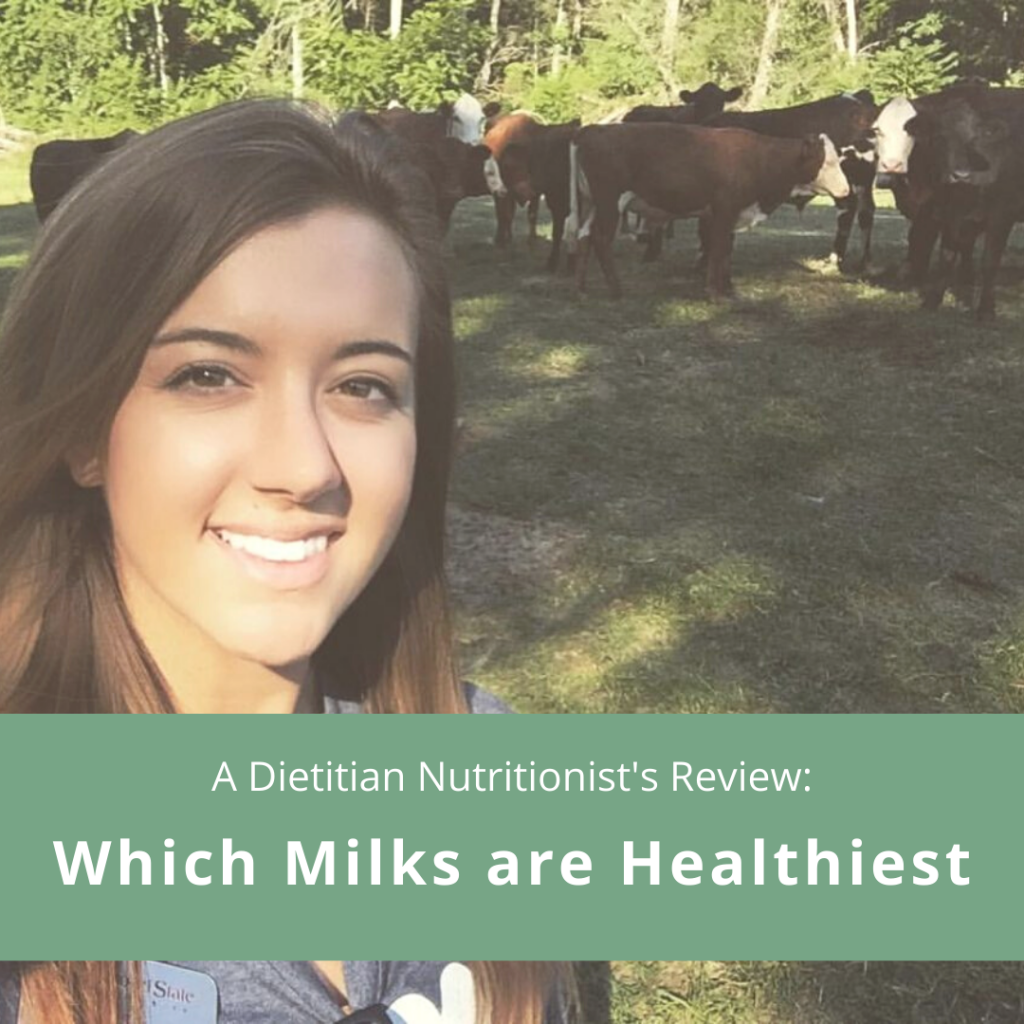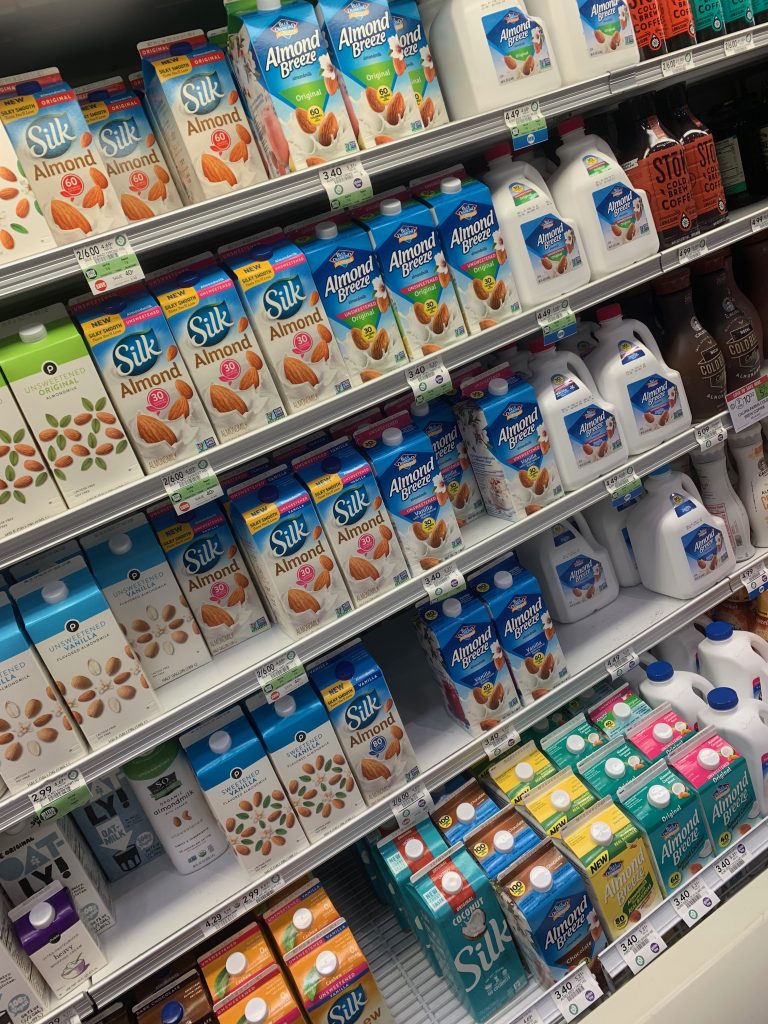
A dietitian nutritionist’s best advice to help you choose the healthiest milk!
Remember when the only difference between milks was the color of the lid? With so many options, gone are the days when you can simply send someone to pick up a half gallon of the light blue cap.
The modern milk aisle can be overwhelming, so we’re here to help you decipher which moo (or non-moo) juice to pick up next time you’re at the store.
Need 1:1 accountability for your healthy eating & weight loss goals?
Apply to our virtual Daily Accountability Program (DAP) today!
Cow’s Milk
If you’re not lactose intolerant and consume dairy, cow’s milk is a perfectly fine choice. I know there are a lot of people who are wary of dairy, and I’m not going to try to change your mind. People can get their calcium from a variety of sources without having to consume dairy products.
Cow’s milk boasts an impressive nutrient profile. Aside from all of the vitamins and minerals milk has (calcium, potassium, phosphorus, & B vitamins), it’s full of protein, carbs, and assuming you don’t buy skim, fat. As a result, it keeps me fuller longer.

I use cow’s milk as a base for fruit smoothies lacking protein and fat, with low-sugar cereals that need a boost of nutrition, or to thicken up my protein ice cream. My go-to is Fairlife 2% because it’s ultra filtered and has 13g of protein per cup. It also happens to be lactose-free, and there is a variety you can buy fortified with heart healthy Omega-3 fatty acids.
Verdict: Cow’s milk is one of the most nutrient dense choices. If you consume dairy, choose a variety with at least some fat. Ultra Filtered milks have more protein and taste great. Lactose-free options are available.
Soy Milk
There is a lot of controversy around soy milk but from a nutrient perspective, it’s a wonderful option for those who are dairy-free. Not only does it have a good source of high-quality protein, but it has similar carbohydrate totals to traditional milk. Be sure to avoid sweetened varieties as they pack a lot of sugar.
If you’re concerned about soy, here’s what I recommend. Quality, whole-food sources of soy protein such as edamame, tempeh, tofu, and soy milk should not be feared. Just like any food, enjoy in moderation as part of a balanced diet. Avoid excessive amounts of soy additives when possible, which are often found in low quality nutrition shakes and packaged diet products.
At the end of the day, you don’t need to consume soy to be healthy. If you’re concerned, don’t sweat it and keep reading.
Verdict: Soy milk’s nutrient is very similar to cow’s milk. It’s a good option for someone looking for a well-rounded vegan alternative.
Almond Milk
I’m gonna group cashew milk here, too. When unsweetened, these milks tend to be very low in calories (less than 40 per cup). This is because they are very low everything- they’re practically water with trace amounts of fat.
These are best used as bases for smoothies that already pack a lot of nutrition from protein powders, greek yogurt, nut butters, seeds, etc as they keep the calorie count down. If you’re trying to gain weight and need more calories, opt for a denser milk.
I often use almond milk as a coffee creamer substitute as it breaks up the bitterness, and I don’t like to drink my calories.
There are nut milk brands which have more sustenance such as Elmhurst, which have 130 calories and >10g of fat per serving. They’re shelf stable and help you feel fuller longer. I highly recommend the Unsweetened Milked Hazelnut flavor!
Verdict: They lack nutrition and don’t have much taste if unsweetened. They’re acceptable if you need a base for smoothies, drink, or recipes that already have a good source of protein, carbohydrate, and fat.
Oat Milk

Holy delicious. If you have yet to try an Oat Milk Latte, you’re missing out. This vegan, gluten free milk creamier than any other milk I’ve tried, and it’s only two ingredients- milk & oats!
While it lacks in protein and fat compared to other milk, it’s a source of quality carbohydrates to boost the nutrition of any drink, smoothie, and shake. Unsweetened oat milk would make a great plant-based substitute for savory, creamy pasta sauces or baked goods.
Verdict: It’s creamy, delicious, vegan, and gluten-free. It’s higher in carbs but lacks protein & fat.
Coconut Milk
If you’re looking to increase the fat content of any recipe, might I suggest coconut milk! Depending on the type you buy, coconut milk’s texture can range from thin to thick, and is commonly used in Southeast Asia and Indian cuisines.
Despite it’s delicious flavor, coconut milk may not be the optimal, everyday milk for anyone trying to lose weight (unless you’re following a ketogenic diet, in which you’re diet is >80% fat, and no other milk variety would work). It’s best used in recipes paired with leaner proteins and fiber when you want a meal that’ll keep you full for a long stretch of time.
Verdict: It’s a high-fat milk alternative used in savory & sweet recipes. Appropriate for any diet, but be mindful of portion size depending on your goals.
Flaxseed Milk
Tastes horrible, not much nutrition unless you buy one fortified with protein. It’s OK in smoothies but there are brands with a lot of fillers like soy & sunflower lecithin, so why bother?
I have similar feelings for hemp milk, which tastes bleh.
Verdict: I’d say skip and opt for soy or cow’s milk, which taste a lot better. Add ground flaxseed and/or hemp seeds to other recipes to get the health benefits.
Pea Milk
I haven’t tried pea milk yet but the nutrition label is impressive- just as much protein as a glass of cow’s milk (8 grams) as well as Vitamin B12.
There are still some fillers in the brands I’ve seen, and the original flavor has organic cane sugar listed as the second ingredient. This signals to me it probably doesn’t taste great without added sweeteners.
Verdict: Pea milk has a lot of protein and minerals that can be tricky to get in a vegan diet. Buy the unsweetened version to avoid added sugars.
Am I forgetting any milks? Let me know in the comments below any other milk varieties you’d like us to review.
Get all of your specific nutrition and diet questions asked by booking a consultation with our Registered Dietitians.
Kait Richardson is a registered dietitian nutritionist in Orlando, FL. She is a partner at a private practice, Nutrition Awareness, where she helps frustrated yo-yo dieters reach their health goals using 1:1 nutrition coaching. She is the co-host of the Nutrition Awareness Podcast.
